As someone who loves the English language, I love learning about how the ways in which our speech and writing has evolved over time. There are so many great examples of phrasing that now runs a little southwest of the conventions of grammar, and my favorite example of this in literature is the functional shift, which is one of William Shakespeare’s most used figurative devices. A functional shift is a verb or noun that is transformed into another part of speech, so this device effectively creates a word that isn’t a real word. For instance, the noun “grave” becomes the verb “graved.”
The beauty of the functional shift is that by changing a word’s part of speech, the brain is made a little uncomfortable. It has to complete some mental gymnastics to be able to parse — or rather create — a meaning of this new word, jumping back and forth between the right and left hemisphere and visual and linguistic domains.
Perhaps the most political and topical way language has evolved within just the past few years, however, is the non-gender specific “they,” which is now also used to refer to a singular person. This use of “they” has been very controversial, with many grammar fanatics claiming that English cannot be swayed to accommodate people who identify as “they” rather than “he” or “she” — similar to the functional shift, “they” is not grammatically correct in this context and is therefore invalid. In effect, you as a non gender conforming person are invalid.
Luckily, these are just opinions, and a few individuals do not control the English language all by themselves. Instead, we as a society get to decide which way English progresses through our speech. Then, the closest people to the “rulers” of the English language — the dictionary writers — get to report on what words mean in today’s age.
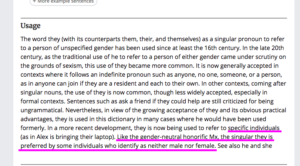
The other day, I was scrolling through twitter (sorry, I’m a Gen Z), and I came across a writer who had tweeted about her experience as a gender nonconforming person submitting to lit mags. Here’s the thread:
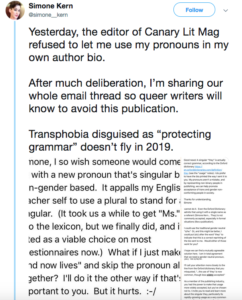
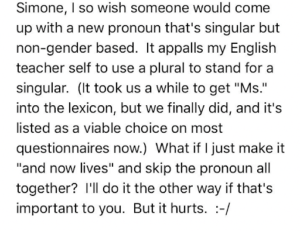
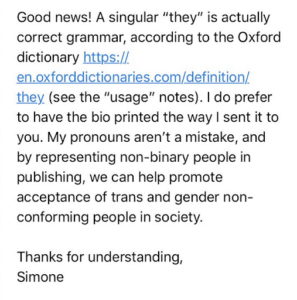
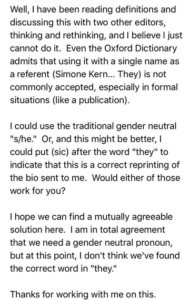
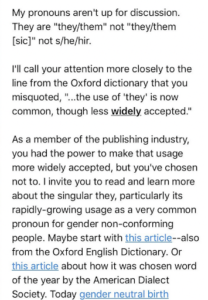
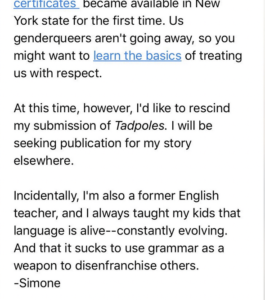
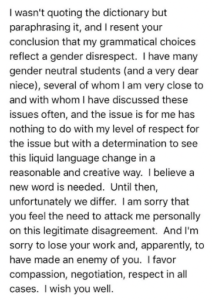
I understand this editor’s plight — she agrees that there should be a gender neutral term, but wants it to be singular otherwise the gods of grammar will commit her to an eternity of grammar purgatory where you have to play hide-and-seek with prepositions forever, all the while knowing that you will never find any preposition as they falsely declare “I’m here!” “I’m up!” “I’m down!” and “I’m beside her!”
However, what I don’t understand is why a lover of language would not celebrate the way language can be adapted and modernized. People’s need to stick to the official books is boring. What would we do without the flexibility of language; without William Shakespeare pushing the English language to its limits? To me, the evolution of language seems to be inherently positive, and I find it hard to view the process of not only reinventing language but grammar as even a little degrading to English.
Don’t get me wrong: I am a grammar lover, but I guess I just find the way language can be morphed and the prospect of everyone having a voice even more wonderful than grammatical perfection. There are so many writers that have much to say but are given less opportunities or less respect in situations like these because of a technicality that really doesn’t mean anything at all.
People using other people’s bad grammar as a defense mechanism to delegitimize what others are saying or who they are has a weird vibe. If you are denying a person the ability to represent themselves fully as a writer on a literary platform or correcting someone else’s grammar as a way of feeling better about yourself, what is the point? People have important things to say whether or not their words or being fits within conventions.
Like the functional shift, “they” is just another way language has evolved, and just as the brain has fun parsing a new ‘shift, it will enjoy becoming accustomed to “they” and all the other new grammatical and linguistic transformations we create in the future.
Grammar is something that can be ruled, fixated on, and managed, and I suppose people find comfort in that — especially when attempting to control people who don’t naturally conform to the typical conventions or binary. Perhaps our experimentation with language and grammar should be flexible, adaptive, and ever-changing, and our mindsets should be, too?





